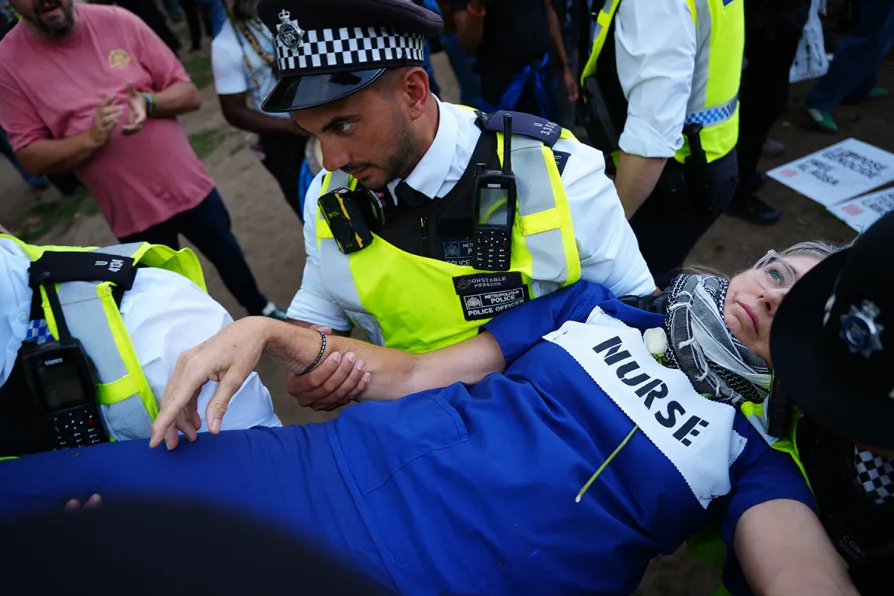Error message
An error occurred while searching, try again later.
 Police officers remove a protester as demonstrators take part in a Lift the Ban on Palestine Action protest organised by Defend our Juries in Parliament Square in London, September 6, 2025
Police officers remove a protester as demonstrators take part in a Lift the Ban on Palestine Action protest organised by Defend our Juries in Parliament Square in London, September 6, 2025
WITH almost 900 people arrested for sitting peacefully with placards in Parliament Square — in a police operation taking 11 hours — as over 200,000 marched through London for Palestine, Labour could indeed face a “poll tax moment” as Defend Our Juries warns.
Mass defiance is making this ban unworkable. Police officers themselves complain of being sent to cart off pensioners under terrorism legislation for wearing a T-shirt or holding a sign. The Met admits the mass arrests are taking officers away from neighbourhood policing, putting huge strain on its resources. Evolving tactics such as declining to give your name and address when arrested, so police have to process each arrest at a station, pile yet further pressure on officers.
We owe a debt to the arrested. It is no joke to take a stand in full knowledge you are likely to be arrested and risk charges that could carry sentences of up to 14 years in prison. Even without that, convictions under terrorism legislation can have lifelong consequences, preventing work in sectors such as education. You may be hurt — witnesses have published footage of violent behaviour by police when making arrests — and could well be held for hours before release on bail. These protesters, of all ages and backgrounds, are showing great courage.
From the start, it has been the mass character of the Palestine movement that has been its strongest defence against repression. Israel’s invasion of Gaza was less than a month old when Tory home secretary Suella Braverman sought to ban marching for a ceasefire on Armistice Day, at the same time inciting far-right thugs to take to the streets in opposition. The 800,000 who marched for Palestine that day ensured that police suppression of the movement was simply impossible: Braverman was soon forced out of office.
Attempts to repress and silence protest against the genocide in Gaza never stopped, with police attempting to make swathes of central London no-go areas for demonstrators and with repression ramping up this January with the arrests of peace movement leaders. Trials for the likes of Palestine Solidarity Campaign’s Ben Jamal, Stop the War’s Chris Nineham and Alex Kenny and the Campaign for Nuclear Disarmament’s Sophie Bolt have been kicked into next year. To an extent “the punishment is the process” — the drawn-out anxiety is itself intended to warn people off protesting.
That underlines the organic link between those who have taken direct action, or are now risking arrest to defend our civil liberties, and the mass movement — whose national demonstrations are a huge show of strength, but which is also evident in the thousands of local actions — fundraisers, film screenings, street stalls, public meetings — held for Palestine in every corner of Britain.
It is a link expressed clearly in the “witness circle” of civil society organisations monitoring police repression, and the “human wall” of peace activists and trade unionists that formed around protesters in Edinburgh this weekend to deter any bid by police to make arrests.
Israel’s aggression against the Palestinians is escalating, and a variety of tactics is necessary to try to force the government to shift. Today the scale of arrests, like the scale of the marches, should help force ministers to rethink the wisdom of the grotesque abuse of counter-terror legislation that banned Palestine Action.
If it is easier for newly installed Home Secretary Shabana Mahmood to do this than Yvette Cooper, who sold the ban to Parliament and the public with a series of unevidenced smears, that is all to the good. And if pressure can be brought to bear on Mahmood in her constituency, where a “Gaza independent” slashed her majority from nearly 30,000 to just over 3,000 at the last election, then that is democracy at work.










